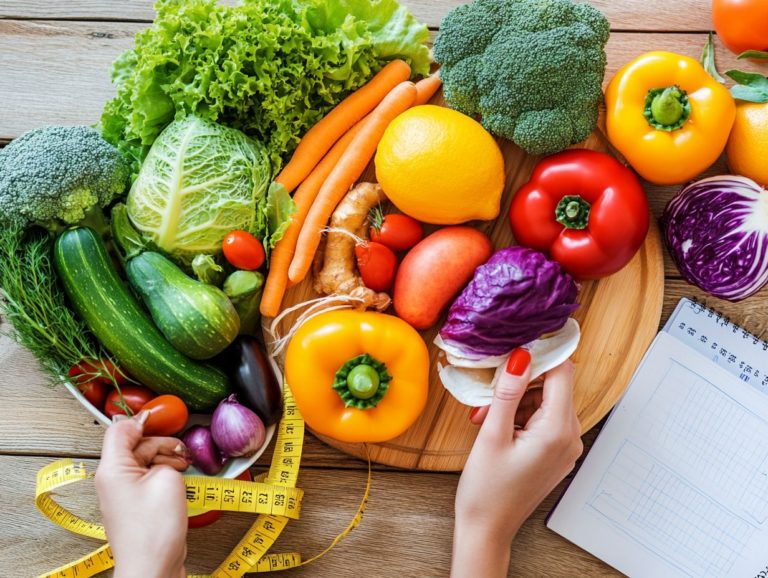What Are the Essentials of Nutrition Education?
Nutrition education is vital for your health. Understanding basic nutrition helps you make better food choices.
Grasping the fundamentals such as macronutrients, micronutrients, and the significance of a balanced diet empowers you to make informed food choices.
This article delves into key concepts in nutrition education, effective teaching strategies, and practical methods to weave healthy eating habits into your daily life. It also tackles common challenges encountered in spreading nutritional knowledge, offering solutions that can enhance its effectiveness.
Start your exciting journey to better health with smart nutrition choices today!
Contents
Key Takeaways:

- Nutrition education is crucial for promoting overall health and well-being by understanding the role of nutrition in the body.
- The key concepts of nutrition education include understanding macronutrients and micronutrients, as well as the importance of a balanced diet and food groups.
- Effective teaching strategies for nutrition education involve incorporating it into daily life and addressing common challenges through practical solutions, while continually evaluating and improving the effectiveness of the education.
The Importance of Nutrition Education
Nutrition education is key to improving health. It gives you the power to make informed food choices that can lead to meaningful behavior change and enhance your overall well-being.
It’s vital for communities to grasp the importance of effective nutrition practices, as these can significantly lower the risk of chronic diseases.
Nutrition education also gives you the skills and knowledge to navigate community resources and dietary guidelines, ensuring that you have access to adequate diets and critical nutrition information.
This knowledge supports lasting health improvements and enriches your path to healthy living.
Understanding the Role of Nutrition in Overall Health
Nutrition serves as a cornerstone of your overall health, impacting everything from your energy levels to the management of chronic diseases. Understanding its significance can lead to remarkably improved health outcomes.
By making informed choices about what you eat, you can elevate your physical well-being and embrace a healthier lifestyle. Following dietary guidelines encourages you to enjoy a balanced diet filled with fruits, vegetables, whole grains, and lean proteins essential components for optimal body function.
Gaining insight into food labeling through nutrition education gives you the power to interpret nutritional content, portion sizes, and ingredient lists. This knowledge is instrumental in identifying foods that align with your unique dietary needs. This heightened awareness not only fosters personal accountability but also deepens your understanding of how nutrition influences your day-to-day vitality and long-term health.
Key Concepts in Nutrition Education
Key concepts in nutrition education involve a thorough understanding of macronutrients and micronutrients, both of which are vital for achieving a balanced diet and optimal health.
You ll discover how these nutrients interact and contribute to your overall well-being, giving you the power to make informed dietary choices.
Macronutrients and Micronutrients
Macronutrients think carbohydrates, proteins, and fats are your body’s energy powerhouses, while micronutrients like vitamins and minerals play essential roles in various bodily functions.
Grasping the balance between these nutrients is key to making informed food choices that align with dietary guidelines. For example, you can elevate your meals by incorporating:
- Whole grains for a boost of complex carbohydrates
- Lean meats or legumes as your protein source
- Healthy fats like avocados or olive oil to enrich your dishes
Don’t overlook the importance of including a vibrant array of fruits and vegetables, which deliver essential micronutrients such as vitamin C and calcium.
By planning meals that are abundant in both macronutrients and micronutrients, you can enhance your overall health, support immune function, and decrease the risk of chronic diseases.
Food Groups and Balanced Diet

Understanding food groups is essential for achieving a balanced diet, as each group contributes unique nutrients vital for maintaining optimal health. By familiarizing yourself with these categories, you can make smarter food choices that support your overall well-being.
The primary food groups include:
- Fruits
- Vegetables
- Grains
- Proteins
- Dairy
Each of these groups plays a crucial role in providing your body with energy, vitamins, and minerals.
For instance, fruits and vegetables are brimming with antioxidants and fiber, while grains deliver the necessary carbohydrates for energy. Proteins assist in muscle repair and growth, and dairy products supply calcium essential for strong bones.
To build a healthy eating habit, it s important to incorporate a variety of these food groups in appropriate portions. This approach helps you meet dietary guidelines, savor diverse flavors, and promote a nutritious lifestyle.
Teaching Strategies for Nutrition Education
Implementing effective teaching strategies for nutrition education is essential for captivating your target audience. These strategies make the learning experience more engaging.
By employing these strategies, you can ensure the successful conveyance of critical information about eating habits and health promotion.
Effective Methods for Teaching Nutrition
Effective methods for teaching nutrition involve hands-on activities, group discussions, and multimedia resources that truly engage you in a meaningful way.
By incorporating real-world scenarios think cooking demonstrations or grocery store tours you can deepen your understanding and retention of nutrition information. These hands-on learning opportunities provide you with a chance to apply your knowledge in practical settings, ultimately enhancing your decision-making when it comes to food choices.
Tailoring these teaching strategies to utilize community resources, like local farmers’ markets or wellness programs, can significantly boost the relevance and accessibility of nutrition education for you. This local focus helps engage the community and addresses specific dietary needs within that population, paving the way for more long-lasting changes in your habits.
Incorporating Nutrition Education in Daily Life
Bringing nutrition education into your daily life can transform your choices! It empowers you to make healthier food choices and enhances your overall well-being.
By embracing practical strategies, such as cooking tips, you can effortlessly incorporate fresh ingredients into your meals, elevating both flavor and nutrition. Meal planning becomes a vital ally in this journey, providing organization and intentionality that makes it easier to select wholesome options throughout the week.
Engaging with community initiatives like local food programs or cooking workshops creates a supportive atmosphere where you can learn from others. This collective effort not only sharpens your food preparation skills but also improves access to nutritious foods, ultimately cultivating a healthier, more informed community for everyone.
Challenges and Solutions in Nutrition Education
Despite its significance, you may find that nutrition education encounters various challenges. Issues like limited food security, insufficient economic resources, and common barriers can impede effective outreach and education efforts.
What will you try first in your journey to better nutrition?
Common Obstacles and How to Overcome Them

Common obstacles in nutrition education, such as lack of resources, misinformation, and cultural barriers, can hinder your ability to learn effectively and make lasting changes in eating habits.
Many communities face challenges accessing accurate information and are often overwhelmed by myths surrounding diets and health. This confusion can lead to poor decision-making that compromises well-being. Financial constraints complicate matters further, limiting access to fresh produce and nutrition programs, deepening nutritional deficiencies.
Collaborating with local organizations can be a game changer. By leveraging community resources like farmers’ markets and health workshops, you can equip yourself with the knowledge and tools needed to make healthier choices.
Using culturally relevant materials and inclusive strategies can truly empower everyone to access vital nutrition education.
Evaluating the Effectiveness of Nutrition Education
Evaluating the effectiveness of nutrition education is crucial for understanding its influence on health promotion. It allows you to identify areas where nutrition-related behaviors can be enhanced, ultimately fostering a more informed and healthier lifestyle.
Measuring Outcomes and Making Improvements
Measuring the outcomes of nutrition education programs requires a thoughtful approach, incorporating various evaluation strategies that assess changing eating habits and overall effectiveness.
To truly grasp the impact, implementing pre- and post-assessments offers valuable insights into participants’ knowledge and habits before and after the program. Focus groups create a space for open discussions, allowing you to gather qualitative data on individual experiences and perceived barriers.
Incorporating community feedback affirms the effectiveness of your initiatives and highlights areas needing improvement. These different ways to measure give you the power to adapt and refine future programs, ensuring they meet the specific needs of the community and lead to more successful outcomes.
Frequently Asked Questions
What Are the Essentials of Nutrition Education?
The essentials of nutrition education include teaching individuals about the importance of a balanced and nutritious diet, as well as how to make healthy food choices.
Why Is Nutrition Education Important?

Nutrition education is important because it helps individuals make informed decisions about their food choices, leading to healthier lifestyles and preventing chronic diseases.
What Topics Should Be Covered in Nutrition Education?
- The basics of nutrition
- How to read food labels
- Meal planning
- The importance of balanced meals
Who Can Benefit from Nutrition Education?
Anyone can benefit from nutrition education, from children and teenagers to adults and seniors. It is never too early or too late to learn about proper nutrition. Are you ready to start your journey toward better nutrition?
How Can Nutrition Education Be Incorporated into Daily Life?
Nutrition education can be incorporated into daily life by making small changes, such as choosing healthier food options, cooking at home, and setting realistic goals for nutrition and wellness.
What Resources Are Available for Nutrition Education?
Many resources are available for nutrition education, including registered dietitians, online materials, community programs, and educational resources from reputable sources such as government agencies and health organizations. Ready to learn more? Dive into our resources today!




